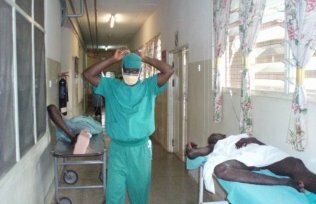copyright (c) 2011 NICHE
Site by websculptures
Sitemap
COST-Africa : Clinical Officer Surgical Training in Malawi and Zambia
Africa’s high maternal mortality is well recognised. Between 200 and 2000 women die in every 100,000 deliveries, which is 100 times greater than the rate in Europe. Less well recognised is the scale of DALYs – disability adjusted life years – lost in Africa from other conditions that are amenable to surgery, such as trauma and inflammatory abdominal conditions. Countless lives – men, women and children – could easily be saved through timely, safe and effective district level surgery and a systematic surgical response to tackle this burden.
African countries have surgeons trained to top international standards, but far too few to tackle the population burden of disease that is amenable to surgery, especially in rural areas. Clinical Officers have been the backbone of clinical care services at health centres and district hospitals in sub-Saharan Africa for decades. Clinical Officers undergo three years basic clinical training and can manage most of the common major diseases. Their qualifications make it much more difficult for them to emigrate than it is for a medical doctor or nurse.
COST-Africa is a research project, funded under the European Union’s FP7 research programme, which aims to demonstrate how Clinical Officers can become the cornerstone of surgical care at the district hospital in Africa. In Zambia, COST-Africa is a collaboration between the Surgical Society of Zambia, comprising the country’s top surgical specialists, and Chainama College of Health Sciences, where additional surgical training is provided to Clinical Officers undergoing post-graduate training as Medical Licentiates. In Malawi, COST-Africa is linked to a three years BSc programme offered by the College of Medicine in Blantyre that comprises modular courses and on-the-job-training in district hospitals.
Internationally, COST-Africa is a collaboration between the Surgical Society of Zambia, the College of Medicine in Malawi, the Royal College of Surgeons in Dublin, Ireland, and Radboud University Medical Centre in Nijmegen, The Netherlands. The European Union is funding this four-country consortium to implement and evaluate the health impact and cost effectiveness of training Clinical Officers (Medical Licentiates in Zambia) to undertake a range of major surgical operations at district (Level 1) hospitals. The study involves randomized controlled trials in Malawi and Zambia and economic analyses that are expected to result in proof-of-concept that surgery can be delivered cost-effectively and safely by non-physician clinicians in district hospitals.
COST-Africa objectives are to:
1. (a) Work with relevant Ministries, Health Professions Councils, and national training colleges to ensure that COST-Africa supports national policy priorities for surgical training of Clinical Officers/Medical Licentiates (COs/MLs) in Malawi and Zambia.
(b) Conduct a situational analysis to map district level surgical services; measure surgical capacity and identify gaps to be addressed prior to delivering surgery safely and effectively in district hospitals; and establish surgical information systems for measuring surgical outcomes in Zambia and Malawi.
2. Design and implement ethically reviewed surgical training interventions for COs/MLs, which include in-service training, supervision and quality control.
3. Measure the effectiveness and impact of the interventions at the levels of health worker, patient, health facility and district population.
4. Establish the cost-effectiveness of the intervention.
5. Support national and regional policy makers in developing career paths and retention strategies aimed at surgically trained Clinical COs/MLs and specialist surgeon-trainers.
The COST-Africa project is led by Prof. Ruairi Brugha from the Royal College of Surgeons in Ireland and runs from 2011 till 2015.
http://www.costafrica.eu/index.html
Related publications:
